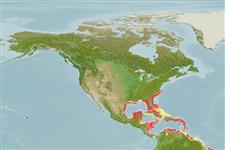Axinella polycapella de Laubenfels, 1953
| Native range | All suitable habitat | Point map | Year 2050 |

|
| This map was computer-generated and has not yet been reviewed. |
| Axinella polycapella AquaMaps Data sources: GBIF OBIS |
Google image |
No photo available for this species.
Classification / Names Common names | Synonyms | CoL | ITIS | WoRMS
Demospongiae | Axinellida | Axinellidae
Environment: milieu / climate zone / depth range / distribution range Ecology
Sessile; depth range 12 - 44 m (Ref. 108813). Tropical
Distribution Countries | FAO areas | Ecosystems | Occurrences | Introductions
Western Central Atlantic.
Length at first maturity / Size / Weight / Age
Maturity: Lm ? range ? - ? cm
Short description Morphology
Life cycle and mating behavior Maturity | Reproduction | Spawning | Eggs | Fecundity | Larvae
Main reference
References | Coordinator | Collaborators
Alvarez, B., R.W.M. van Soest and K. Rützler 1998 A revision of Axinellidae (Porifera: Demospongiae) of the Central-West Atlantic region. Smithson. Contrib. Zool. 598, 47 p. (Ref. 81712)
IUCN Red List Status
(Ref. 130435: Version 2025-1)
CITES status (Ref. 108899)
CMS (Ref. 116361)
Threat to humans
Human uses
Fisheries: commercial
| FishSource |
Tools
More information
Diet composition
Food consumption
Predators
Max. ages / sizes
Length-weight rel.
Length-length rel.
Length-frequencies
Mass conversion
Abundance
Internet sources
BHL | BOLD Systems | CISTI | DiscoverLife | FAO(Publication : search) | Fishipedia | GenBank (genome, nucleotide) | GloBI | Gomexsi | Google Books | Google Scholar | Google | PubMed | Tree of Life | Wikipedia (Go, Search) | Zoological Record


